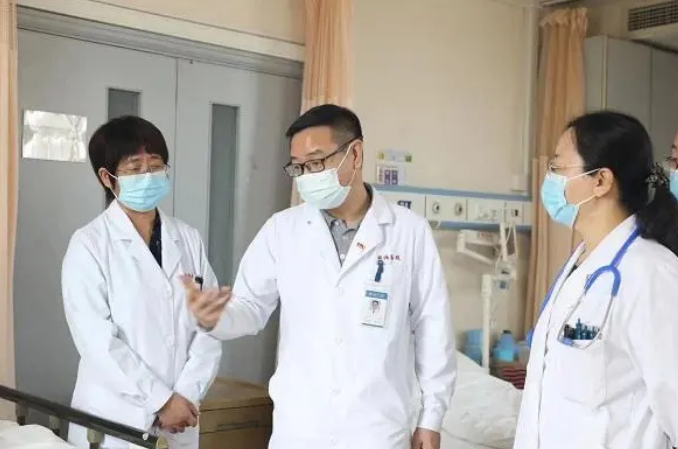
Multiple myeloma (MM) is a common malignant tumor of the blood system. It is currently incurable. Patients will eventually face the problem of recurrence. As the number of recurrences increases, treatment becomes more difficult, seriously increasing the burden on patients and affecting their quality of life. Although the treatment of multiple myeloma has achieved certain results with the continuous advent of new drugs and the improvement of detection methods, it is difficult to achieve breakthroughs with traditional treatment options.
The emergence of CAR-T (chimeric antigen receptor T cell) therapy has broken the dilemma in the treatment of hematological tumors. As “living cells”, CAR-T infusion can expand and survive for a long time in the patient’s body, so most patients can achieve lasting anti-tumor effects with just one dose of infusion.
Professor Liang Aibin, Vice President of Tongji Hospital Affiliated to Tongji University, said that multiple myeloma is the second most common malignant tumor of the blood system, with an incidence rate second only to lymphoma and higher than leukemia. At present, multiple myeloma is more common in the elderly, but it is also gradually showing a trend of onset in younger people. In clinical practice, patients who develop the disease in their forties are often seen. Typical symptoms of multiple myeloma include increased blood calcium, renal damage, anemia, bone disease, and amyloidosis. The most common reason for patients with early-stage multiple myeloma to seek treatment is bone pain, so misdiagnosis at the first diagnosis is also common.
Shanghai Tongji Hospital was the first in the country to start clinical research on CAR-T cell immunotherapy in 2014, and was one of the first units in China to carry out CAR-T cell immunotherapy. As a pioneer in the field of cell therapy, there is no more experience to draw from before. However, under the leadership of Professor Liang Aibin, the hematology team of Tongji Hospital has overcome many difficulties in clinical research and diagnosis and treatment, and accumulated experience in CAR-T therapy. A method of whole-process management. Professor Liang Aibin said: “In order to ultimately achieve the maximum benefit of CAR-T treatment and reduce the harm of possible toxic side effects, it is very important and necessary to implement the full-course management of CAR-T treatment. After years of accumulation and continuous optimization, Shanghai Tongji The hospital launched the ‘Full Process Management of CAR-T Treatment’, which includes a series of links from cell preparation to cell reinfusion, from prevention and control of toxic side effects to long-term efficacy follow-up, as well as building a modern full-process management platform to achieve multidisciplinary diagnosis and treatment (MDT). It aims to be patient-centered and serve the treatment needs of patients.” At present, Tongji blood medical staff have rich clinical experience in the diagnosis, treatment and care of various common and difficult diseases of the blood system. The annual outpatient volume and number of hospital admissions rank among It ranks among the top tertiary comprehensive hospitals in Shanghai.
It is understood that there are currently a number of CAR-T drugs approved for marketing around the world. Regarding the progress of CAR-T cell therapy in the field of multiple myeloma, Professor Liang Aibin said: “In recent years, CAR-T cell therapy has made great progress. Quickly, in the field of multiple myeloma, three products have been approved for marketing. Among them, China has currently approved a fully human CAR-T igene injection. This CAR-T is China’s first This is a CAR-T cell therapy independently developed and produced in its entirety. It is also the first fully human-targeted BCMA CAR-T product approved for marketing in the world and in China. It can be said that the approval of Yijiaolunzai Injection The launch has greatly promoted the development of CAR-T cell therapy in the field of multiple myeloma. More commercial CAR-T will be launched in the future, enriching the track in the field of myeloma treatment. We look forward to CAR-T therapy It can truly bring the possibility of cure to patients in the future.”
China’s CAR-T cell therapy has achieved remarkable success in the past 10 years. In the past five years, the clinical scale of CAR-T treatment by the blood team of Shanghai Tongji Hospital has also increased year by year. Professor Liang Aibin said that the types of diseases treated have expanded from the initial single acute lymphoblastic leukemia to various blood tumors such as lymphoma and multiple myeloma, and the therapeutic targets have expanded from single targets to dual targets. This is the current domestic CAR- It is one of the units with the largest series of research projects on refractory/relapsed hematological tumors, the most complete types, and the best clinical efficacy. More than 30% of the patients are recommended by medical units in other provinces and cities, and have achieved good social benefits.
At the same time, the Hematology Department of Shanghai Tongji Hospital relies on the hospital’s strong technical strength, international service model, and elegant and convenient medical conditions to provide standardized and high-quality diagnostic and treatment services to overseas patients. It is understood that a Thai multiple myeloma patient who had relapsed after multiple lines of treatment and had no available drugs recently came to Shanghai Tongji Hospital to receive fully human BCMA CAR-T treatment after being recommended and consulted by a doctor.